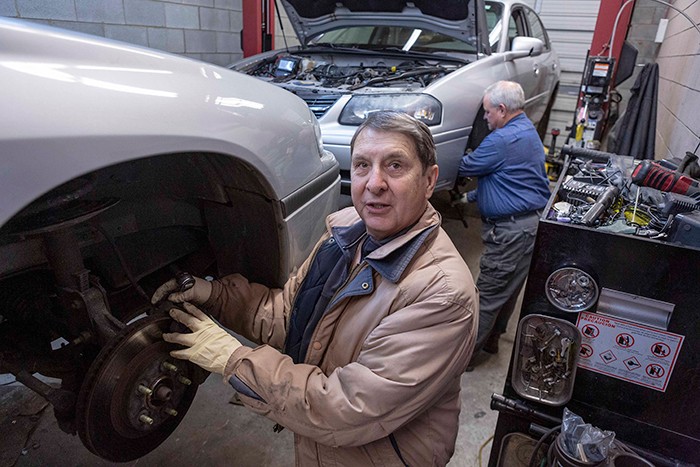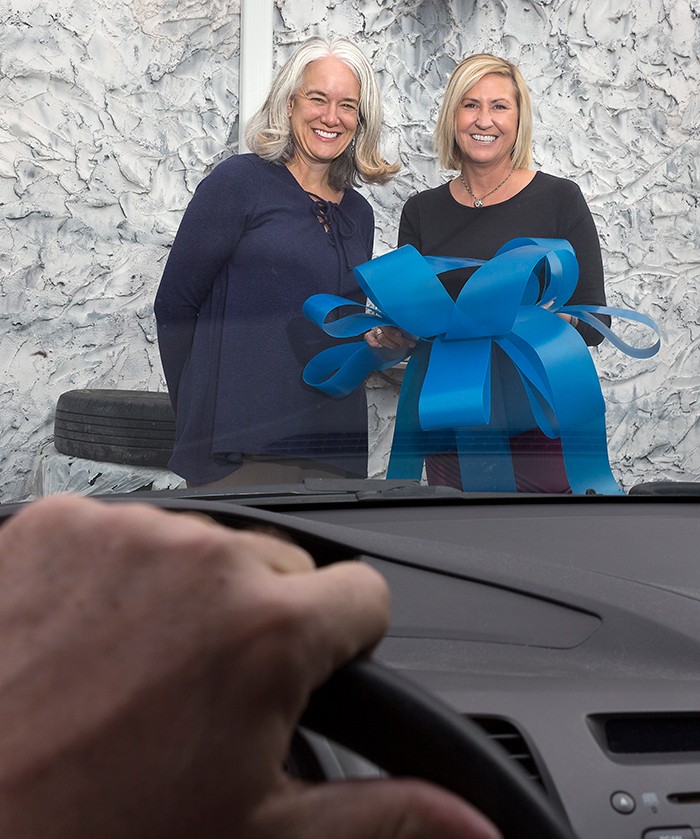Imagine living without a car and not having the means to buy one.
For Katrina Leggins of Raleigh, it meant both personal and professional hardship. She had a job in 2016, using her car to transport people with disabilities. It put a lot of wear and tear on the car, and not long after, the car died, and she lost her job at the same time.
“I went two years without a car — riding a bus or taking a cab,” she said. “It was challenging to find a job doing what I do without a car.”
Enter Wheels 4 Hope, a nonprofit that pairs donated cars with people who cannot afford to buy a vehicle.
After receiving a car from Wheels 4 Hope, Leggins was able to return to work, assisting people with disabilities with their transportation needs. What’s more, she enjoys the simple things many people with cars take for granted — meeting her 7-year-old daughter for lunch at school or getting groceries without a walk home from the bus stop.
It’s a story that Elaine Pleasants, executive director for Wheels 4 Hope, hears often.

Volunteers Lane Gallow, left, and Tom Hilliard work on donated cars at Wheels4Hope in downtown Raleigh. The nonprofit provides low-cost cars to economically vulnerable families and individuals.
“It’s a really interesting thing to think about what your life would be like without a car — that’s what I get reminded of often,” Pleasants said. “You meet that family that, in addition to work every day, has to figure out how to get the kids to daycare, go to the grocery store and all the things we take for granted.”
Wheels 4 Hope began in 2000 at West Raleigh Presbyterian Church. Two men, John Weistart and Chris Simes, saw struggling families in need of reliable transportation. For five years, a handful of volunteers repaired donated cars and worked with local agencies to find families in need, Pleasants says.
Their outreach spread as they partnered with more congregations and local agencies until in 2010, they moved into a large space outside downtown Raleigh. At the same time, the organization hired two full-time staff members, which allowed about 100 families to receive cars that year. The nonprofit has continued to grow, expanding into the Triad in 2012 and giving away 176 cars last year, and their staff has grown to eight.
To date, Wheels 4 Hope has placed more than 1,500 cars with families, Pleasants says.
The goal for 2019 is 250 cars, fueled in part by an upcoming move to a larger space in Cary, where the organization is renovating the old Austin Foods warehouse off East Durham Road.
“We’ll have the opportunity to expand the number of people we can help pretty quickly,” Pleasants said.
People donate their vehicle, and Wheels 4 Hope determines if it will help someone who is struggling with self-sufficiency, Pleasants says. The vehicle must be repairable within the organization’s budget — which usually excludes engine or transmission replacement — and must be affordable for the family to maintain. That means good gas efficiency and no oversized SUVs or exotic cars that will cost more over time.
“We only do one thing — we’re not case managers or social workers — we fix and sell cars,” she said.
The organization accepts any car, but only 25 percent are placed with families. The other 75 percent of cars still help the cause — they’re either repaired and sold to the public, or taken to auction and sold.
“Every car helps us, because the proceeds from cars in those other two groups pay for the program cars,” Pleasants said.
People are referred to Wheels 4 Hope from one of more than 70 partner organizations in the Triangle. Clients can’t call Wheels 4 Hope directly and ask for a car, but instead, must have a case history with one of the partner organizations.
“Getting a car and having it help you are two different things,” Pleasants pointed out. “If you can’t afford to maintain it, put gas in it, and insure it, then it doesn’t really help.”
To be eligible for a car, people must meet certain criteria, including having a job and having no other vehicles already in their household, she says.
Once the person or family is referred to Wheels 4 Hope, the organization picks the car for them based on the size and features they may need. They are required to pay $500 for the car, plus tax, tags and processing fees. Once they take ownership, they are also responsible for insurance and property taxes on the car, Pleasants says.
Cars help people regain their independence and their free time. Pleasants tells of a recovering drug addict who found a great third-shift job, but the buses don’t run overnight. His only option was to ride the bus to work two hours before his shift started and then wait.
“By getting a car, he got so much of his day back,” she said. “We’ve enhanced their lives so much that now they can move forward and do great things.”
The resale of donated vehicles covers about 80 percent of Wheels 4 Hope’s annual budget, leaving 20 percent to be covered through other means. Those interested in contributing to the mission of Wheels 4 Hope can help in the following ways:
- Donate a car or make a financial donation. Visit wheels4hope.org to fill out a form providing information about your vehicle, and someone will contact you. Or call the office at (919) 832-1941 to discuss the donation by phone. Financial donations can also be made online or by mail.
- Volunteer. Mechanics – those with professional training or tinkerers who know their way around an oil change – are needed. Car runners, who pick up donated vehicles, get them washed, inspected or taken to a garage, are also needed. Volunteer hours are flexible.
- Become a community partner. Congregations are important partners for the organization, according to Elaine Pleasants. “We spend a lot of time talking to them about our needs,” she said. “They advertise for us in their bulletins and online.” Partner garages can help by donating the labor to fix as few as one car per quarter.
- I’ll Have the Combo!
- Yoga for Everyone
- Making friends after 55
- Nonprofit Spotlight: Wheels 4 Hope
- Building a Resilient Cary
- Small Business Spotlight: Excel Body Fitness
- A New Kind of Brew
- Seven Saturdays from R&D Brewing
- Flying Pepper Tobago Infused Vodka
- Sing a Song of Solomon’s Seals
- From the Editor: April 2019







In Need of a car but, I live in Ashe County,NC where there is no public transportation and I had to quit my job as a result,how can I be eligible for this program.
Hi Iris! Please reach out to Wheels 4 Hope directly!